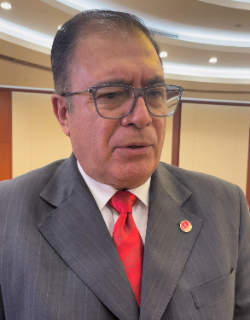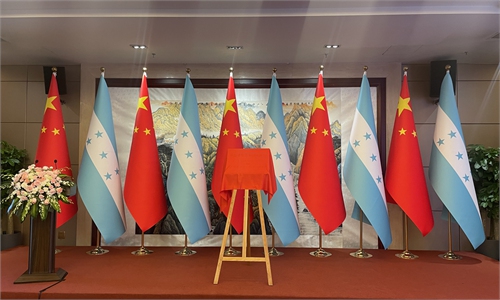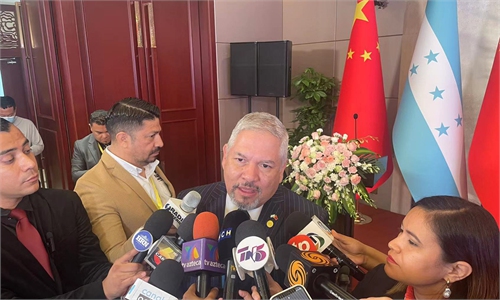Exclusive: More Honduran products to be exported to China with lower cost, faster speed and more opportunities: Honduran official

Fredis Cerrato, Honduran Minister of Economic Development, speaks with the Global Times during an exclusive interview. Photo: Chen Qingqing/GT
Since the establishment of diplomatic relations between China and Honduras, Honduran exports such as coffee and shrimp no longer need to go through Taiwan island as a transit but can be directly sold to the Chinese mainland market, signaling "lower cost, faster speed and more opportunities," Fredis Cerrato, Honduran Minister of Economic Development, told the Global Times in an exclusive interview on Sunday.
Over the past week, a Honduran business delegation has visited various provinces in China and negotiated with local entrepreneurs, Cerrato told the Global Times during a high-level entrepreneur exchange meeting between China and Honduras held in Beijing on Sunday.
At present, the cooperation intentions and progress between the two countries' business communities are mainly concentrated in the agricultural sector, such as exports to China of Honduran coffee, white shrimp, melon and other agricultural products. In the next stage, Honduras is looking forward to further expanding cooperation with China in the areas of investment, energy, telecommunications, and infrastructure, the minister said.
The exchange meeting was held during the ongoing six-day visit of Honduran President Xiomara Castro to China, during which topics such as expanding Honduras' agricultural exports to China, China's investment in Honduras and Free Trade Agreement (FTA) negotiations on projects under the Belt and Road Initiative are expected to be discussed.
Honduras is one of the largest coffee beans growers in Central America, and agriculture is the dominant sector in its economy, while its industrial base is relatively weak. The main exports include crops such as coffee, bananas and shrimp, as well as minerals such as zinc and silver, according to media reports.
On Monday, Honduras and China will sign an agreement to establish two working groups to promote the signing of an FTA and cooperation between enterprises, Cerrato said.
"We are very much looking forward to the signing of an FTA between the two countries, but this requires a longer time to study various details and establish corresponding legal mechanisms," the minister noted. The two sides are also discussing the facilitation of business visas to promote the growth of bilateral economic and trade exchanges, he said.
Previously, as the two countries had not established diplomatic relations, most of the coffee, shrimp and other agricultural products exported to China from Honduras had to "go through an extra step" in Taiwan island, that is, they were first exported to Taiwan and then to the Chinese mainland, Cerrato noted.
But in the future, more Honduran agricultural products will no longer need Taiwan as a "middleman" and will be able to be sold more quickly and directly to the Chinese mainland and reach people's tables. "Because the customers and suppliers are all in place, we are making rapid progress in these areas," he said, noting that direct exports of Honduran goods to the Chinese mainland also means "lower costs, faster speed, and more opportunities."
President Castro formally requested the country's admission to the BRICS-led New Development Bank (NDB) after she visited its headquarters in Shanghai on Saturday. She also visited a Huawei research center on the same day, highlighting pragmatic cooperation during her trip to China.
Cerrato said the process of applying for membership in the BRICS-led NDB has been initiated and Honduras will strive to meet all the conditions of the bank and seek to be accepted by it.
When asked to comment on the "debt trap" narrative in the Western media in relation to the Belt and Road Initiative and whether it would create or exacerbate Honduras' debt crisis, Cerrato said the initiative was beneficial to both sides. "All the decisions we make are aimed at improving the living conditions of our people."
In 2021, trade between China and Honduras grew 67.1 percent year-on-year to $1.62 billion, according to statistics from Chinese customs. By the end of 2021, Chinese enterprises had signed contracts worth $640 million in Honduras and completed a turnover of $700 million, according to the Chinese Ministry of Commerce.



